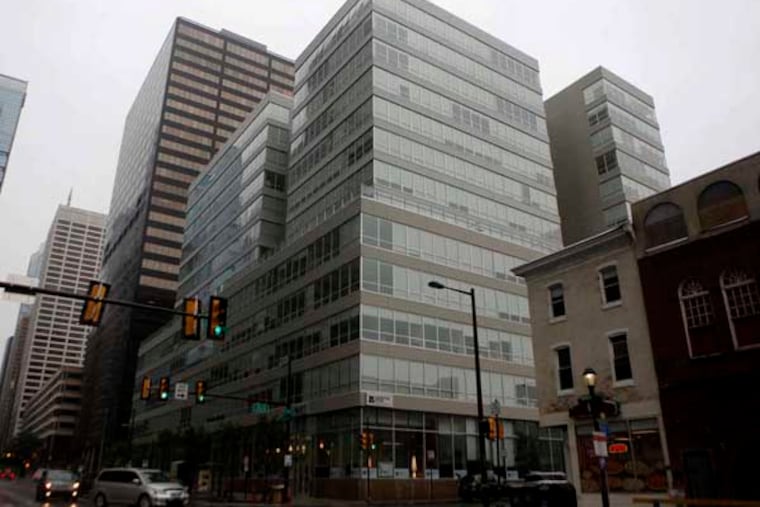Stemming the loss of Center City office space
PMC Property Group has a novel idea for part of the Center City office building it just bought: Offices. The company's practice of buying up tired old office properties and refurbishing them into sleek, high-end apartments has helped make it one of Philadelphia's biggest residential landlords.

PMC Property Group has a novel idea for part of the Center City office building it just bought:
Offices.
The company's practice of buying up tired old office properties and refurbishing them into sleek, high-end apartments has helped make it one of Philadelphia's biggest residential landlords.
It hasn't been working alone: Up to seven million square feet of office space - the equivalent of almost six Comcast Center towers - has left the market over the last 25 years, most of it converted to residential use, according to real estate services firm JLL.
But as a flood of proposed rental properties in central Philadelphia coincides with a shrinking supply of office space, PMC is tweaking its formula at a former U.S. headquarters of drugmaker GlaxoSmithKline, which it purchased last month.
The company plans to fill the 24-story building at 200 N. 16th St. with a mix of office and residential units, similar to its plan for the Marketplace Design Center at 2400 Market St., which it purchased earlier this year.
"We feel there is a tremendous amount of multifamily housing in the pipeline, and there's not as much office," PMC executive vice president Jonathan Stavin said. "We're working to identify a level of office that's not being met."
Office vacancies in Center City and University City and at the Navy Yard were at 9.9 percent in the quarter ended June 2015, down from a five-year high of 13.5 percent at the end of 2010, according to JLL.
Meanwhile, the current inventory of multifamily residential units in Center City has ballooned to 17,600 units, said JLL's Philadelphia research director, Lauren Gilchrist, citing data from real estate tracker REIS Inc.
An additional 3,300 residential units are in progress and likely to be delivered over the next two years or so, Gilchrist said, an inventory increase of about 19 percent.
"We've basically been swapping commercial space for residential space now for close to 10 years," said Kevin Gillen, a senior research fellow at Drexel University's Lindy Institute for Urban Innovation and chief economist at Meyers Research L.L.C. "I think we're reaching a point of near-saturation."
Major office-to-apartment conversions include PMC's transformation of the former AAA Mid-Atlantic headquarters at 2040 Market St. into a 282-unit residential building with ground-floor retail.
Another such project, the renovation of a historic 25-story building at 1616 Walnut St. into the 206-unit Icon apartment tower, sold this year for $112 million.
Developer Post Bros. is converting the 93-year-old, 21-story Atlantic Building at 260 S. Broad St. into 160 rentals and 40 condominiums.
Even part of Two Liberty Place, one of Philadelphia's earliest skyscrapers, has been adapted into homes, all being sold as condos.
New buildings, too, have contributed to the apartment inventory, such as developer Carl Dranoff's 85-unit SouthStar Lofts at Broad and South Streets, which opened in April 2014, and the recently completed 110-unit AQ Rittenhouse high-rise at 2021 Chestnut St.
In the pipeline are such residential projects as PMC's 250-unit One Water Street at 230 N. Columbus Blvd. and a 29-story, 321-unit rental building Brandywine Realty Trust, the city's biggest office landlord, and partners are constructing at 1919 Market St.
"We're getting a little bit overbuilt, especially in the apartment and rental sector," Gillen said. "I would like to see our portfolio of downtown space be a little more balanced between the commercial and residential sectors."
Some of that imbalance may be on its way to being corrected. The 59-story Comcast Innovation and Technology Center being built by Liberty Property Trust at 1800 Arch St. will add 1.29 million square feet of offices to the city's inventory when it is completed in the fall of 2017, although all of that space has been spoken for by the cable giant.
At its FMC tower project near 30th Street Station, Brandywine plans 635,000 square feet of office space, along with 268 luxury apartments, due for completion in the second half of 2016. National Real Estate Development's East Market project at 11th and Market Streets and Brickstone Cos.' development at 11th and Chestnut Streets, both now under construction, also will include offices.
PMC's Stavin said work could begin early next year at the 16th Street tower known as One Franklin Plaza, which made up part of GSK's headquarters complex between Race and Vine Streets. The tower has been empty since the pharmaceuticals firm left for the Navy Yard in 2013.
Internationally prominent architecture firm Gensler, which also is designing the interiors at the new Comcast tower, has been hired by PMC for its plan to re-skin the structure, which will be renamed One Franklin Tower.
The developer wants to renovate the 200,000 square feet of office space on the building's lower nine floors, with the rest of the roughly 607,000-square-foot building converted to apartments.
Atop the sprawling industrial building that makes up the Marketplace Design Center, meanwhile, PMC plans to build a mid-rise tower and develop the property into offices and residences, a financial partner on the project has said.
"Space that might have gone residential is now going office," said Paul Levy, president and chief executive of the Center City District. "That's a reflection of some improving market realities," such as the expansion of Comcast, Philadelphia's leading technology employer, and the growth of co-working businesses.
Bill Luff, executive managing director for Colliers International's Philadelphia office, said the growth in apartment inventories and office demand are connected.
Now that people live in the urban core, he said, they want to work there, too, and corporate bosses are taking notice.
"Those decision-makers are saying, 'I want to be near where my workforce wants to live,' " Luff said.
215-854-2615 @jacobadelman